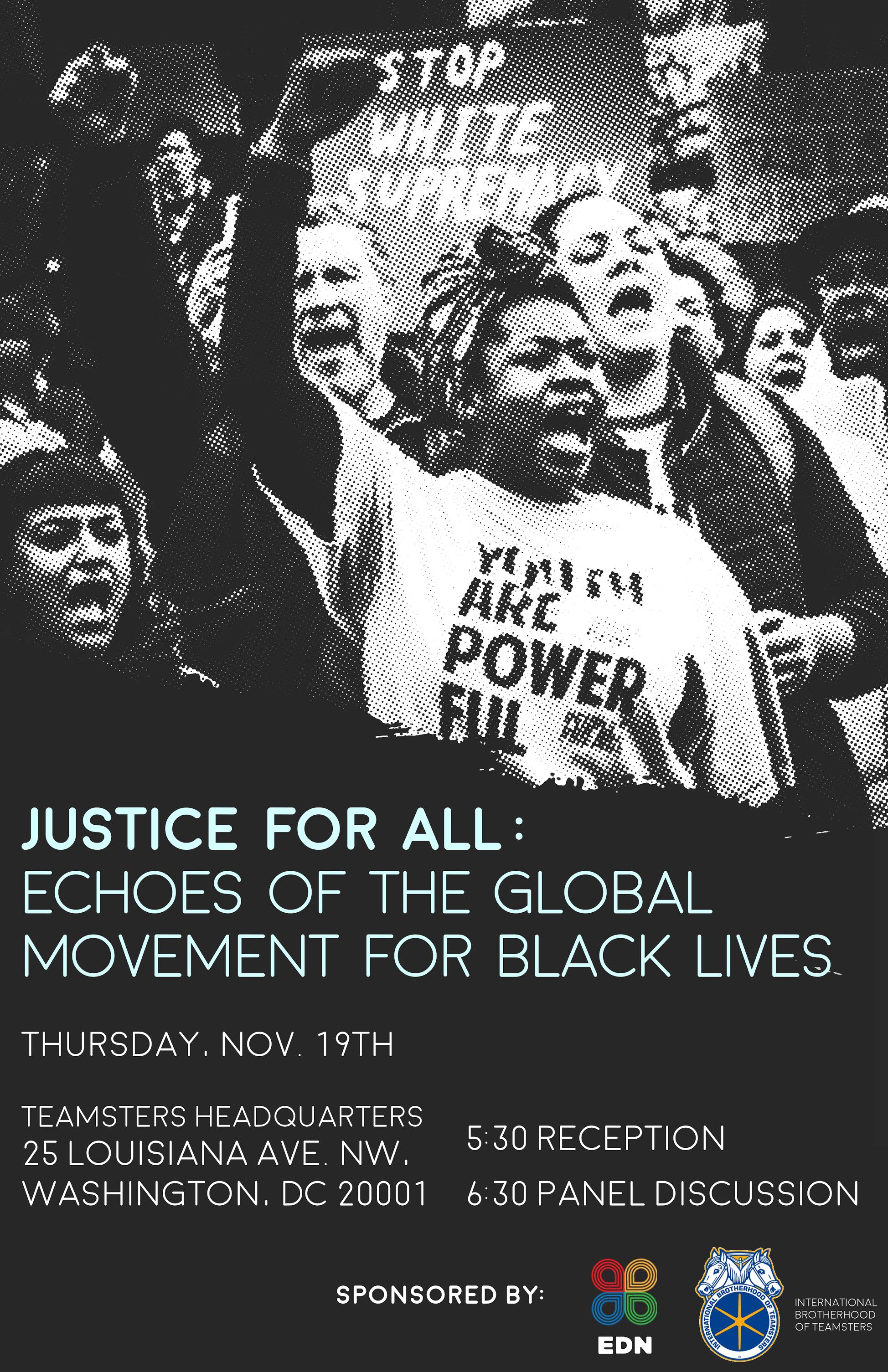On November 19th, 2015, EDN co-sponsored a panel event titled “Justice for All: Echoes of the Global Movement for Black Lives.” Held in partnership with the International Brotherhood of Teamsters, the panel included representatives from the Eritrean-American community and activists from various social justice movements, working to address racial inequities in policing, employment, immigration and access to justice. The discussion was detailed, impassioned, and provocative, and involved an extended Q&A between the panelists and a large audience. A number of specific issues were addressed, including racialized policing, mass criminalization, fair employment, and the role of Eritreans and other African immigrant groups in the #BlackLivesMatter movement.
The panel built on the theme of a blog that EDN published in December 2014, Who’s Down for Mike Brown? The African Diaspora and Racialized Policing, which called for the African diaspora generally, and the Eritrean diaspora specifically, to become more firmly involved in combatting the scourge of racialized policing in the U.S. Written in the midst of the Mike Brown and Eric Garner tragedies, this call to arms was designed to not only spur action, but to identify the alignment of interests between Eritrean-Americans and the larger black community. Embedded within the piece was also a grain of criticism: too often members of the Eritrean diaspora are not fully “present” within the social and political life of their adopted communities. We must do more to engage.
The need to be more fully engaged in our adopted communities has again been highlighted by the San Bernardino and Paris attacks. As one might expect, these attacks have spawned a necessary debate on how best to combat terrorism at home and abroad. Yet they have also triggered a level of xenophobia and racism towards Muslims Americans that is deeply troubling. This xenophobia finds expression in the demagoguery of certain politicians, the endless barrage of media coverage in which the “loyalty” of Muslims seems an appropriate subject of debate, and the recurring calls to halt Muslim immigration into the U.S.
These trends erode the shared values and traditions that are the cornerstone of American democracy, and are counterproductive in the struggle against terrorism. This fight can only be won by unifying Americans of all backgrounds around the core principles of pluralism and tolerance. Ostracizing and alienating our religious minorities will simply compound our current challenges.
Eritrean-Americans can help offer a model to the problematic discourse on terrorism that has done much to stigmatize Muslim Americans. Eritreans have been victims of terrorism, both in the U.S. and abroad (see San Bernardino and ISIS killings in Libya), and are aware of the terrible social, economic, and political impacts it can have. At the same time, Eritrea is a multi-religious community with a centuries long tradition of inter-religious harmony—as such, the Eritrean experience can help contribute to a climate of tolerance in the U.S. so that an entire religious community is not held responsible for the crimes of an extreme fringe. After all, if one minority group can so easily be victimized, all ethnic and religious minorities are at risk.
Each of us can make a small contribution to this cause in different ways. It begins, of course, with holding our political leaders accountable, either at the ballot box or through other forms of political expression. We can also demonstrate our solidarity over social media and in our private people-to-people interactions. And we can stop consuming media that deliberately peddles Islamophobic and intolerant narratives. There are also a number of resources and opportunities to get involved with the work of our gracious panelists below. If you missed our conversation, you can view the livetweets here.
Whatever we choose to do as individuals, it is important that we once again remind ourselves that as Eritrean-Americans our fates are linked to the well being of our adopted homeland and the struggle of minority communities for dignity and inclusion.
- Black Alliance for Just Immigration
- Black Lives Matter DMV
- Black Palestinian Solidarity
- End the Occupation
- International Brotherhood of Teamsters
- #NotOneDime is an economic boycott created by Rahiel Tesfamariam
- The Discount Foundation has written a report on Black Workers Matter
- Black Lives Matter: Eliminating Racial Inequity in the Criminal Justice System
EDN’s Civic Engagement Workgroup is planning a series of workshops and panels in the coming months. To stay abreast, subscribe to our Civic Engagement listserv.

